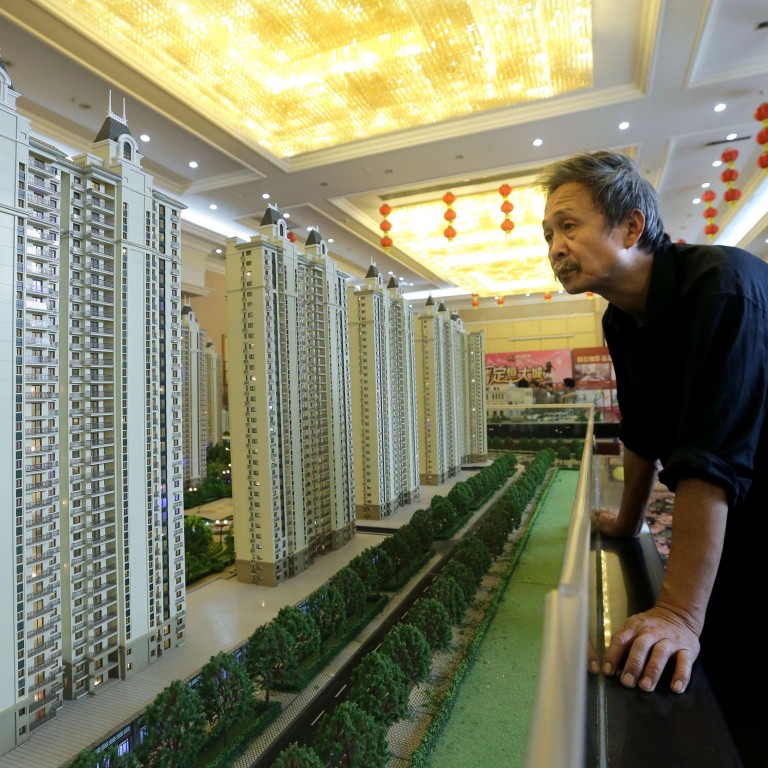
Evergrande a case study in being too big to fail despite 350b yuan liability
Mainland developer's massive debt a case study of China's bad loan problem and the banks and wealthy investors who stand to benefit from it
For those wanting to get below the surface of China's bad debt problems, nothing is more instructive than a look into the 350 billion yuan liability at Evergrande Real Estate Group.
That figure is not a typo. The Guangzhou-based developer has accumulated a liability 10 per cent higher than the 2013 gross domestic product of Beijing. That includes a 90.9 billion bank loan, 44.5 billion yuan in perpetual bonds that are held by banks and their high-net-worth clients and 61 billion yuan in trust borrowings.
How the developer - sitting on 250 per cent gearing - will pay it all back is not the key question; the real puzzle is why the banks and the wealthy went for it. Then again, for a manager of a city bank lending to Evergrande is a dream come true. As a household name, it's everywhere: the country's top soccer team, the buildings and the bottled water. And it is one of the country's top developers.
Of course, your bank is eager to grow its loan book and bottom line in order to join the IPO queue. After the big boys have already scooped up the big-name deals, Evergrande is the next best.
In some cases, the bonds have been repackaged into products to be sold to highnet- worth clients
No wonder the list of Evergrande's principal bankers grew from 14 to 21 in 2013 - mainly city commercial lenders.
The bankers also love the financial innovation displayed by Evergrande. Take how its perpetual bond is structured. Instead of granting Evergrande a plain loan, Bank A will get its fund house or a third-party one to launch a fund or investment scheme backed by the developer's bond. Bank A will then subscribe to the fund with its own money. That arrangement disguises a loan as a bond investment. The banks love it for two reasons. First, the return is more than double the official lending rate - 10-11 per cent for the first two years, 12-13 per cent for the third and 16-18 per cent in the fourth year and thereafter, according to research reports citing the management.
Though it is a "loan" without maturity, the creditors assume the borrower will repay the principal before the penalising interest rate kicks in. Whether the developer can find the money to pay doesn't seem to be a concern.
Crucially, since it is not a loan, it will not be caught up in regulatory hurdles, such as controls on lending to developers, the cap on lending to a single borrower, and the requirement to back up the loan book growth with equity. You get to grow your bottom line without being nagged by the regulators.
The fund house will then transfer the money to a project company of the developer via Bank B to give the deal an independent look.
The project company will use the money to repay the parent company for the land premium, the company conceded in its 2013 annual report.
The developer not only gets to use the loan for land premium - barred by Beijing - it also reduces its gearing because a perpetual bond is classified as equity rather than loan.
If Bank A has already lent to Evergrande, that will also bring an improvement in the credit profit of its core borrower.
In some cases, the bonds have been repackaged into financial products to be sold to high-net-worth clients. How about promising the clients an 8 per cent return, pocketing the spread and bearing no risk?
Mind you, the sense of risk is quite different among the newly rich in China. A private banker recalled how she was snubbed by her mainland clients when she advised against betting on Evergrande papers.
"I know the country. Evergrande is everywhere," they told the banker. "Where else can you get a double-digit yield from such a big name?"
Evergrande managed to sell 25 billion yuan in perpetual bonds in 2013 and a further 19.5 billion yuan worth in the first half of this year. It is expecting to sell a further nine billion yuan of these bonds before the year ends. This is the reality of financing on the mainland.
Analysts say the hefty interest leaves the company facing a cash shortfall a 23.9 billion yuan by the end of the year. As for how the developer will fund the gap, that doesn't appear to be an issue. Certainly not for chairman Hui Kayan, who has been talking up diversification into milk powder, grain and oil and busily preparing for a press conference on Monday that will "catch attention from all over the world".
With this massive debt, Evergrande is now too big to fail - and Hui, it seems, is not the only one who knows that.

